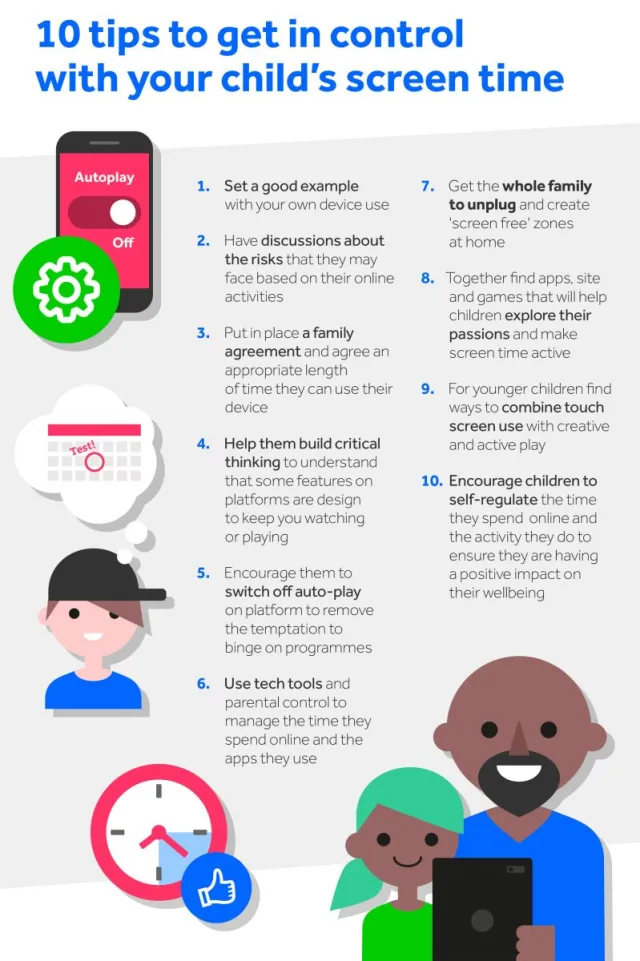From smartphones and tablets to computers and televisions, screens surround us everywhere. While screen time can offer benefits when used appropriately, excessive or unregulated screen time can have detrimental effects on children’s well-being.
In this article, we will explore 11 reasons why excessive screen time is harmful to kids.
1. Impaired Physical Health
Excessive screen time often leads to a sedentary lifestyle, contributing to a decline in physical health. Children who spend prolonged hours in front of screens are at a higher risk of obesity, as they tend to engage in less physical activity.
Insufficient exercise can lead to various health problems, including cardiovascular issues, muscle weakness, and poor posture.

2. Sleep Disruptions
Screens emit blue light that can interfere with the body’s natural sleep-wake cycle. Excessive screen time, particularly before bedtime, can disrupt sleep patterns and lead to difficulties falling asleep.
Inadequate sleep negatively impacts children’s cognitive functioning, mood regulation, and overall well-being.
3. Impaired Social Skills
Excessive screen time can hinder the development of essential social skills in children. When children spend excessive hours in front of screens, they miss out on valuable opportunities for face-to-face interactions and meaningful connections with peers.
This can result in poor communication skills, decreased empathy, and difficulty forming and maintaining relationships.

4. Reduced Physical Activity
Excessive screen time often replaces physical activities, such as outdoor play or sports. This sedentary behavior can lead to a lack of exercise, which is crucial for a child’s physical development.
Insufficient physical activity can impair motor skills, coordination, and overall physical fitness.
5. Negative Impact on Mental Health
Excessive screen time has been linked to an increased risk of mental health issues in children. Continuous exposure to social media, online bullying, and violent or inappropriate content can contribute to anxiety, depression, and low self-esteem.
Moreover, the constant comparison to idealized images and lives portrayed on social media can negatively impact a child’s body image and overall mental well-being.
6. Academic Impairments
Spending excessive time on screens can hinder academic performance. The distractions posed by screens, such as social media notifications or online games, can reduce focus and attention span.
Excessive screen time can also lead to poor time management and procrastination, impacting a child’s ability to complete homework and study effectively.
7. Language and Cognitive Development Issues
Excessive screen time may impede language and cognitive development in young children. Excessive exposure to screens can limit opportunities for meaningful conversations, interactive play, and hands-on learning experiences.
This can hinder language acquisition, cognitive skills development, and the ability to think critically and creatively.
8. Eye Strain and Vision Problems
Extended periods of screen time can strain the eyes and contribute to various vision problems in children. Staring at screens for prolonged hours can cause eye fatigue, dryness, and discomfort.
Additionally, excessive near-focused activities can lead to myopia (nearsightedness) and other vision issues.
9. Poor Time Management and Productivity
Excessive screen time can disrupt a child’s ability to manage time effectively and be productive.
Spending countless hours on screens can lead to a lack of structure and organization, resulting in difficulties completing tasks, meeting deadlines, and developing essential time management skills.

10. Increased Aggression and Behavioral Issues
Excessive exposure to screens, particularly violent or aggressive content, has been associated with an increase in aggressive behavior and behavioral issues in children.
Research suggests that prolonged exposure to violent media can desensitize children to real-life violence and promote aggressive attitudes and behaviors.
11. Impaired Development of Real-World Skills
Excessive screen time can limit opportunities for children to engage in real-world activities and develop essential life skills. Activities such as imaginative play, outdoor exploration, and social interactions offer valuable learning experiences that screens cannot replicate.
Excessive reliance on screens may hinder the development of problem-solving abilities, creativity, and critical thinking skills.
Conclusion
In conclusion, while screens have become an integral part of our lives, it is crucial to recognize the potential harmful effects of excessive screen time on children.
Impaired physical health, disrupted sleep patterns, impaired social skills, negative impact on mental health, academic impairments, language and cognitive development issues, eye strain and vision problems, poor time management and productivity, increased aggression and behavioral issues, and impaired development of real-world skills are among the key reasons why excessive screen time can be detrimental to kids.
Striking a balance and encouraging healthy screen habits with appropriate limits and parental guidance are essential for supporting children’s overall well-being and development.
Click here for a similar article on the benefits of screen time
FAQs
Q: How much screen time is considered excessive for kids?
A: The American Academy of Pediatrics recommends no more than 1 to 2 hours of recreational screen time per day for children aged 2 to 5, and consistent limits for older children.
Q: Can educational content on screens mitigate the negative effects?
A: While educational content can have benefits, excessive screen time, even with educational content, can still pose risks to children’s health and development. Moderation and balanced screen use are crucial.
Q: What are some practical strategies for reducing excessive screen time?
A: Setting screen time limits, establishing tech-free zones or periods, encouraging alternative activities like outdoor play, engaging in family activities, and promoting open communication about screen use can help reduce excessive screen time.
Q: How can parents promote a healthy relationship with screens for their children?
A: Parents can serve as role models by practicing healthy screen habits themselves, engaging in co-viewing or co-playing activities, selecting age-appropriate and high-quality content, and fostering a balanced lifestyle that includes a variety of activities beyond screens.
Q: Are all screens equally harmful, or are some better than others?
A: Different screens and content can have varying impacts. However, it is important to set limits and monitor the content regardless of the device to ensure a healthy screen environment for children.